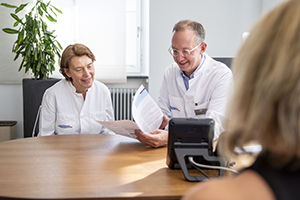Calling, Scientific Progress, and Humanity: An Interview with a Doctor Transforming Lives

Prof. Dr. Robert Thimme, Medical Director of the Department of Gastroenterology, Hepatology, Endocrinology, and Infectious Diseases, shares insights into his professional journey, explores trends in medical advancements, and discusses the transformative impact of personalized medicine in modern healthcare.
- What initially inspired you to pursue a career in medicine, particularly in gastroenterology and hepatology?
I have been fascinated by medicine since childhood. To me, it is more than just a job – it is an opportunity to combine scientific, analytical thinking with practical application, while working closely with people. This unique blend of improving patients' lives and contributing to scientific progress makes medicine one of the most fulfilling and impactful fields of work.
My passion for gastroenterology and hepatology emerged during my university years, inspired by Professor Gerok's lectures. The broad scope of the discipline, encompassing multiple organs and diverse diseases, captured my interest and solidified my commitment to the field.
- As an experienced physician who works daily with numerous patients and complex cases, what advice would you give for maintaining long-term health? And what steps do you take to maintain your own health?
The most important advice is: everything in moderation! A healthy lifestyle, characterized by balanced nutrition, limited alcohol consumption, sufficient sleep, and regular physical activity, is the key to long-term well-being. These simple habits significantly reduce the risk of many diseases.
As for my personal approach, I make it a priority to find time to restore my physical and emotional strength. Reading, cycling, walking and travelling with family or friends help me a lot.
- In your opinion, what should people pay attention to when choosing their diet and physical activities?
I believe the Mediterranean diet is an excellent example of a balanced and nutritious eating plan. However, moderation is crucial: minimize alcohol consumption and avoid overeating.
As for physical activity, I always encourage people to choose activities that they really enjoy and that fit into their lifestyle. Whether it’s walking, swimming, yoga, or any other form of exercise, what matters most is that it brings positive emotions. As Frederick the Great once said: "Everyone should find happiness in their own way!"
- How do you assess the role of personalized medicine in treating liver diseases, chronic gastroenterological conditions, and gastrointestinal tumors?
In essence, any therapy should be personalized and tailored to the specific needs and circumstances of each patient. Today, the term "personalized medicine" refers to a concept in which advanced molecular and genetic diagnostic methods are used to create individualized treatment plans.
This concept is now fully integrated into clinical practice. At our molecular tumor board, we provide personalized treatment strategies to almost all patients who do not respond to standard therapies. The impact of personalized medicine cannot be overstated – it is reshaping the way we approach healthcare.
- How do you see the future of medical research? What changes and trends do you anticipate in the next 10-20 years?
The advancements in medical research are truly remarkable. We are gaining deeper insights into the mechanisms of diseases and developing innovative, targeted approaches to their prevention and treatment. In the next 10 to 20 years, medicine will become significantly more personalized and digitized. Cutting-edge technologies and analytical systems will enable us to diagnose and treat diseases with even greater precision. The potential for progress is boundless.
- Could you share the most rewarding and challenging moment of your professional career?
There isn’t a single moment that stands out, but rather countless experiences. The most rewarding moments are those when you can cure a patient or greatly alleviate their suffering – it’s profoundly fulfilling.
The most challenging moments occur when a disease has progressed so far that full recovery is no longer possible. However, even in such cases, there is always room to improve the patient’s quality of life. Ultimately, one guiding principle remains at the heart of all our actions: the patient always comes first.
Back